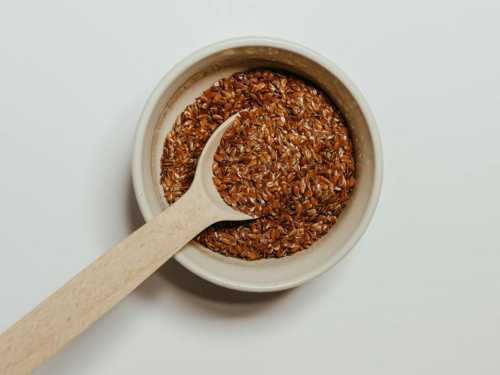
Flaxseeds are credited with a host of health benefits, including improving digestion, lowering blood sugar and cholesterol levels, and strengthening the cardiovascular system. But which of these benefits are actually scientifically proven, and which are just marketing hype?
The concept of “superfoods” is often a marketing ploy that creates inflated expectations for individual foods, while the real health benefits come from a balanced and varied diet as a whole. It is important to look for scientifically based evidence rather than blindly believing high-sounding advertising claims.
I feel like the “superfood” craze sometimes distracts me from the basic principles of healthy eating. I always try to remember that no single product is a panacea, and the real power lies in a comprehensive, conscious diet. This helps me not to be fooled by the new “wonder foods” on the market.
What are the benefits of flax seeds?
The grains of the plant contain many beneficial substances: iron, sodium, magnesium, zinc, calcium, phosphorus, iron, potassium, B vitamins, vitamins A, E, ascorbic acid.
In addition, flax seeds contain thiamine, niacin, Omega-3 (especially alpha-linolenic acid, ALA), and Omega-6.
The most studied components in flax seeds that are attributed to positive effects on humans are dietary fiber, omega-3 fatty acids, and a complex of antioxidants, particularly lignans.
Lignans, in addition to their antioxidant properties, are also known for their ability to influence hormonal balance, as they are phytoestrogens. This means that they can bind to estrogen receptors in the body, potentially modulating the risk of certain hormone-dependent diseases. Their dual function as antioxidants and phytoestrogens makes them particularly interesting to researchers.
In addition, scientists are paying attention to less studied compounds – cyclic peptides, which are active even in microscopic doses. It is assumed that these substances can help reduce cholesterol and glucose levels in the blood, and also have an antioxidant effect. However, scientific data on them is not enough today, so research is ongoing.
The greatest effect of flax seeds should be expected as a source of dietary fiber. Soluble dietary fiber is necessary for the intestinal microflora. They also, interacting with water, form a gel-like substance that slows down the emptying of the stomach and the absorption of glucose, which helps stabilize blood sugar levels after a meal. This also creates a feeling of satiety, which can be useful for weight control. Insoluble fiber contributes to the mechanical cleansing of the intestines, the excretion of cholesterol and glucose, and stimulates its motility.
Omega-3 fatty acids, present in flaxseed oil and seeds, play an important role in maintaining the health of the body. Residents of Ukraine mainly consume sunflower oil, which is rich in omega-6 fatty acids. However, to maintain balance, it is necessary to additionally include sources of omega-3 in the diet, such as flaxseed oil and seeds. Omega-3 fatty acids strengthen blood vessels, reduce the risk of inflammation and have a positive effect on overall health.
I realize how deeply sunflower oil has taken root in Ukrainian cuisine, and this creates a certain challenge in achieving the optimal balance of Omega-3 and Omega-6. For me, this became an occasion to experiment with different oils – rapeseed, olive, and also actively use flaxseed oil for salads. It is not only about health, but also about expanding taste horizons.
It's amazing how much nutrition can be packed into such a small seed. I often add ground flax to my oatmeal or smoothies, and it makes me feel like I'm doing something good for my body by supplementing my regular meals with something truly nutritious. It's like a small but powerful contribution to my daily health.
Can they be harmful?
Despite the benefits, there are some nuances to consider. Flax seeds contain cyanogenic glycosides, which can be converted into toxic compounds in the body.
When crushed, these compounds are more easily released from the seeds, and therefore a larger amount can enter the body. Therefore, you should not abuse flax seeds, you should limit yourself to 50 g per day, for children the norm is lower. In this case, there will be no negative effect.
For optimal nutrient absorption and to minimize the risk of Omega-3 oxidation, it is recommended to consume flax seeds freshly ground. You can grind them in small portions and store them in an airtight container in the refrigerator for no longer than a week. Whole seeds pass through the digestive tract in transit, and most of their nutrients are not absorbed.
Of course, you should not consume grains if you are allergic to them.
Flaxseed is also not recommended for cholecystitis, pancreatitis, liver failure, gallstones, or kidney stones. This once again emphasizes how important it is to consult a doctor or qualified nutritionist, especially if you have any chronic diseases. What is good for one person may be harmful to another.
The product has a choleretic effect, so it can cause stones to move out of the gallbladder.
Additionally, flax seeds may cause flatulence and bloating in some people.
Flax seeds do have beneficial properties, but they should be consumed in moderation and in the right form. They enrich the diet with dietary fiber and omega-3 fatty acids, but at the same time they contain potentially toxic compounds that cannot be ignored. By following the recommended norms, you can get the maximum benefit without harm to your health.





